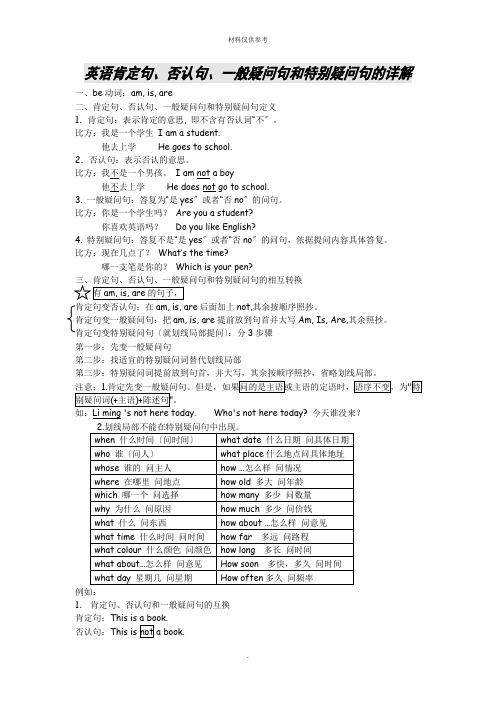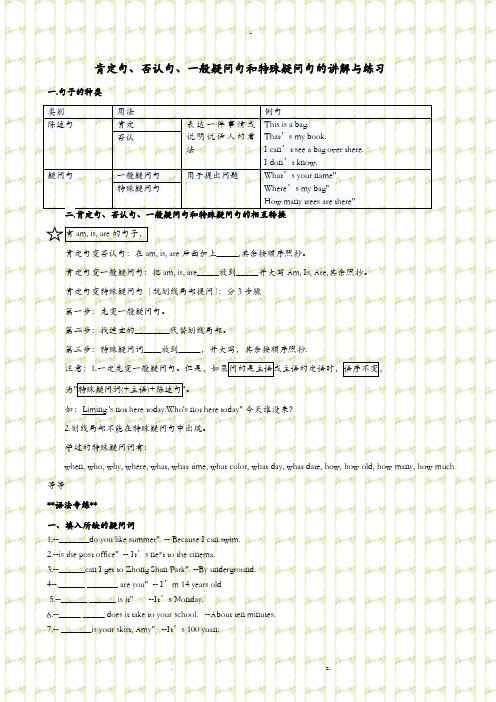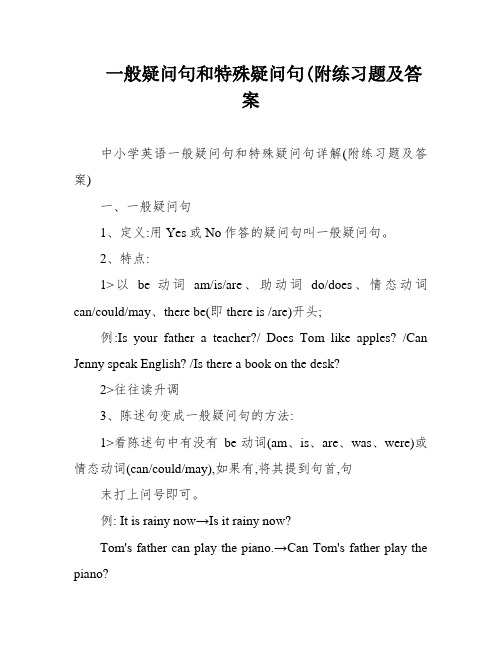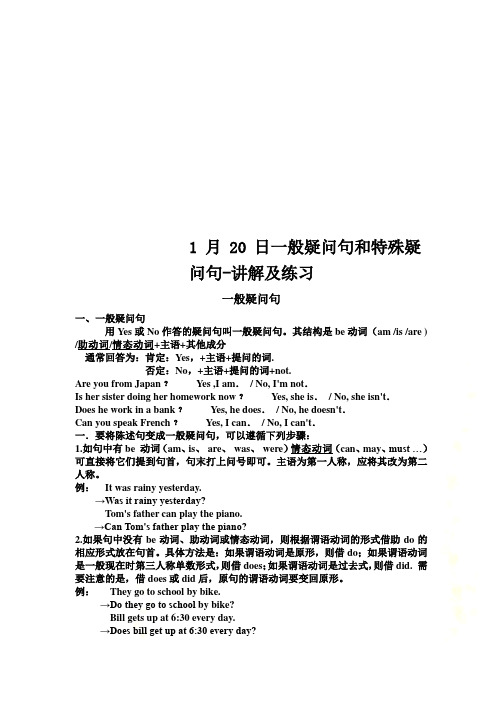月日一般疑问句和特殊疑问句讲解及练习
1月20日一般疑问句和特殊疑问句-讲解及练习

1月20日一般疑问句和特殊疑问句-讲解及练习DAmerica?三.一般疑问句的回答1.第一个词:不是Yes就是No。
(有时根据语气的不同,Yes可由Sure, Certainly, Of course等代替.NO可由sorry 代替.)2.第二个词:问谁答谁。
即答语中的主语须与问句的主语一致(必须用主格代词)。
例:Does she clean her room every day? Yes, she does.Is Anna′s father a doctor?No, he isn′t.如果主语是this that,回答时用it 代替。
Is this your pen? Yes, it is. No, it isn't.如果问句中主语these, those,回答时用they 代替。
Are those your books? Yes, they are. No, they aren't.3.第三个词:用什么问,用什么答。
即用问句中的提问词。
Can Jim play soccer? Yes, he can.Does Mr Bean speak English? Yes, he does.需注意问题:用may 引导的问句,肯定回答用may,否定回答用can′t 或mustn′t,用must 引导的问句,肯定回答用must,否定回答用needn′t/ don’t have to例:May I go to the park now? Yes, you may. /No, you mustn′t.Must I wash my clothes now? Yes, you must. /No, you needn′t.4.作否定回答时,结尾要加上not。
否定回答最好缩写,而肯定回答不能缩写。
例:Did Thomas come here yesterday? Yes, he did./ No ,he didn′t.Is Lin Lin in Class 3? Yes, she is. / No, she isn′t.特殊疑问句以疑问词开头,对句中某一成分提问的句子叫特殊疑问句。
(完整版)英语一般疑问句和特殊疑问句的讲解及练习

一般疑问句用be动词(am /is主语+其他成分,+主语+提问的词.否定:No,+主语+提问的词+not.Are you from Japan﹖Yes ,I am./ No, I'm not.Is her sister doing her homework now﹖Yes, she is./ No, she isn't.Does he work in a bank﹖Yes, he does./ No, he doesn't.Can you speak French﹖Yes, I can./ No, I can't.一: 般疑问句还有下列特点:1、以be动词、助动词或情态动词开头;例:Is your father a teacher? Does Catherine like animals? Can Jenny speak French?二: 如何将陈述句变成一般疑问句?1.如句中有be 动词(am、is、are、was、were can、may、must …)或助动词(do、does、did、have、had(完成时中))时,可直接将它们提到句首,句末打上问号即可。
主语为第一人称,应将其改为第二人称。
例:It was rainy yesterday.→Was it rainy yesterday?Tom's father can play the piano.→Can Tom's father play the piano?I have finished my homework.→Have you finished your homework?2.如果句中没有be动词、助动词或情态动词,则根据谓语动词的形式借助do的相应形式放在句首。
具体方法是:如果谓语动词是原形,则借do;如果谓语动词是一般现在时第三人称单数形式,则借does;如果谓语动词是过去式,则借did. 需要注意的是,借does或did后,原句的谓语动词要变回原形。
(完整版)英语一般疑问句和特殊疑问句的讲解及练习(最新整理)

一般疑问句用Yes 或No 作答的疑问句叫一般疑问句。
其结构是be 动词(am /is /are ) /助动词/情态动词+主语+其他成分通常回答为:肯定:Yes,+主语+提问的词.否定:No,+主语+提问的词+not.Are you from Japan﹖Yes ,I am./ No, I'm not.Is her sister doing her homework now﹖Yes, she is./ No, sheisn't.Does he work in a bank﹖Yes, he does./ No, he doesn't.Can you speak French﹖Yes, I can./ No, I can't.一: 般疑问句还有下列特点:1、以be 动词、助动词或情态动词开头;例:Is your father a teacher? Does Catherine like animals? Can Jenny speak French?二: 如何将陈述句变成一般疑问句?要将陈述句变成一般疑问句,可以遵循下列步骤:1.如句中有be 动词(am、is、are、was、were)情态动词(can、may、must …)或助动词(do、does、did、 have、had(完成时中))时,可直接将它们提到句首,句末打上问号即可。
主语为第一人称,应将其改为第二人称。
例:It was rainy yesterday.→Was it rainy yesterday?Tom's father can play the piano.→Can Tom's father play the piano?I have finished my homework.→Have you finished your homework?2.如果句中没有be 动词、助动词或情态动词,则根据谓语动词的形式借助do 的相应形式放在句首。
一般、特殊、选择疑问句专题讲解(附习题答案)

“一般疑问句”【概念】: 一般疑问句是指用Yes / No来回答的疑问句,读时要用升调。
eg: ---Is this your pencil 这是你的铅笔吗---Yes, it is. 是的,它是。
:--- Are those bananas 那些是香蕉吗--- No, they aren’t. 不,它们不是。
【结构】:1. 连系动词be +主语+其他回答时主语必须为相应的人称代词,且为主格形式。
肯定回答:Yes, 主语+ be.否定回答:No, 主语+ be not.be和not可缩写为:isn’t, aren’t, wasn’t, weren’t【例句】①—Are they all here 他们都在这儿吗—Yes, they are. / No, they aren’t. 是的,他们都在。
/不,他们不在。
)②—Is your father a musician—No, he is.2. 情态动词+ 主语+动词原形+其他肯定回答:Yes, 主语+情态动词.否定回答:No, 主语+情态动词+ not.情态动词和not可缩写为:can’t, mustn’t, needn’t, shouldn’t.【例句】①— Can the boy play the guitar 那个男孩会弹吉他吗---Yes, he can. / No, he can’t. 是的,他会。
/ 不,他不会。
②—Can you swim—Yes, I can.[3. 助动词( Do / Does / Did)+主语+动词原形+其他肯定回答:Yes, 主语+ do / does / did.否定回答:No, 主语+ do / does / did+ not.(助动词和not也常用缩写形式:don’t, doesn’t, didn’t.【例句】①—Do you want to go to the movie 你想去看电影吗—Yes, I do. / No, I don’t. 是的,我想去。
1月20日一般疑问句和特殊疑问句-讲解及练习

一般疑问句一、一般疑问句作答的疑问句叫一般疑问句。
其结构是be动词(am /is /are )主语+其他成分Yes,+主语+提问的词.否定:No,+主语+提问的词+not.Are you from Japan﹖Yes ,I am./ No, I'm not.Is her sister doing her homework now﹖Yes, she is./ No, she isn't.Does he work in a bank﹖Yes, he does./ No, he doesn't.Can you speak French﹖Yes, I can./ No, I can't.1.如句中有be 动词(am、is、are、was、were can、may、must …)可直接将它们提到句首,句末打上问号即可。
应将其改为第二人称。
例:It was rainy yesterday.→Was it rainy yesterday?Tom's father can play the piano.→Can Tom's father play the piano?2.如果句中没有be动词、助动词或情态动词,则根据谓语动词的形式借助do的相应形式放在句首。
具体方法是:如果谓语动词是原形,则借do;如果谓语动词是一般现在时第三人称单数形式,则借does;如果谓语动词是过去式,则借did. 需要注意的是,借does或did后,原句的谓语动词要变回原形。
例:They go to school by bike.→Do they go to school by bike?Bill gets up at 6:30 every day.→Does bill get up at 6:30 every day?The students saw a film yesterday.→Did the students see a film yesterday?二.陈述句变一般疑问句应注意的事项1.如果陈述句中有第一人称,则变问句时最好要变为第二人称。
小学英语一般疑问句和特殊疑问句(附练习题)

英语肯定句、否认句、一般疑问句和特别疑问句的详解一、be动词:am, is, are二、肯定句、否认句、一般疑问句和特别疑问句定义1.肯定句:表示肯定的意思, 即不含有否认词“不〞。
比方:我是一个学生I am a student.他去上学He goes to school.2.否认句:表示否认的意思。
比方:我不是一个男孩。
I am not a boy他不去上学He does not go to school.3. 一般疑问句:答复为“是yes〞或者“否no〞的问句。
比方:你是一个学生吗?Are you a student?你喜欢英语吗?Do you like English?4. 特别疑问句:答复不是“是yes〞或者“否no〞的问句,依据提问内容具体答复。
比方:现在几点了?What’s the time?哪一支笔是你的?Which is your pen?am, is, are后面加上not,其余按顺序照抄。
肯定句变一般疑问句:把am, is, are提前放到句首并大写Am, Is, Are,其余照抄。
:分3步骤第一步:先变一般疑问句第二步:找适宜的特别疑问词替代划线局部第三步:特别疑问词提前放到句首,并大写,其余按顺序照抄,省略划线局部。
如:Li ming 's not here today.Who's not here today? 今天谁没来?例如:1.肯定句、否认句和一般疑问句的互换肯定句:否认句:一般疑问句:Is this a book?肯定答复:Yes, it is.否认答复:No, it isn’t.2.就划线局部提问(变特别疑问句)This is a book.第一步:变一般疑问句Is this a book?第二步:找适宜的特别疑问词Is this what ?第三步:特别疑问词提前放到句首,并大写,其余按顺序照抄,省略划线局部。
do not或者does not,其余按顺序照抄动词用原形肯定句变一般疑问句:在句首加do或者does并大写,其余照抄。
肯定句、否定句、一般疑问句和特殊疑问句的讲解与练习

肯定句、否认句、一般疑问句和特殊疑问句的讲解与练习一.句子的种类类别用法例句陈述句肯定表达一件事情或说明说话人的看法This is a bag.That’s my book.I can’t see a bag over there.I don’t know.否认疑问句一般疑问句用于提出问题What’s your name"Where’s my bag"How many trees are there"特殊疑问句二.肯定句、否认句、一般疑问句和特殊疑问句的相互转换有am, is, are的句子,肯定句变否认句:在am, is, are后面加上_____,其余按顺序照抄。
肯定句变一般疑问句:把am, is, are_____放到_____并大写Am, Is, Are,其余照抄。
肯定句变特殊疑问句〔就划线局部提问〕:分3步骤第一步:先变一般疑问句。
第二步:找适宜的________代替划线局部。
第三步:特殊疑问词____放到_____,并大写,其余按顺序照抄.注意:1.一定先变一般疑问句。
但是,如果问的是主语或主语的定语时,语序不变,为"特殊疑问词(+主语)+陈述句"。
如:Liming 's not here today.Who's not here today" 今天谁没来?2.划线局部不能在特殊疑问句中出现。
学过的特殊疑问词有:when, who, why, where, what, what time, what color, what day, what date, how, how old, how many, how much 等等**语法专练**一、填入所缺的疑问词1.--_______do you like summer" -- Because I can swim.2.--is the post office" -- It’s ne*t to the cinema.3.--______can I get to Zhong Shan Park" --By underground.4--.______ _______ are you" -- I’m 14 years old5.--______ ______ is it" --It’s Monday.6.--_____ _____ does it take to your school. --About ten minutes.7.-- _______is your skirt, Amy" --It’s 100 yuan.8.--____ is today" --It’s February, fifth.二.句型转换1. There are 50 students in our class.否认句:______________________________________________一般疑问句:_______________________________________特殊疑问句:_______________________________________2. It takes Mike thirty minutes to go to school.一般疑问句:___________________________________________________否认句:_________________________________________________________3. I usually play football on Friday afternoon.否认句:__________________________________________________________一般疑问句:____________ __________________________________________就划线局部提问_______________________________ ____________________4. The book costs Mary ten yuan. 否认句:________________________________________________________一般疑问句:______________________________________________________ 划线提问:____________ ____________________________________________5. Today is February 5th, Tuesday. 否认句:____________ ______________________________________________ 一般疑问句:________________________________ ______________________ 划线提问_________________________________________________________ 6. Tom does his homework at home. 否认句:_______________________________________________________ ___ 一般疑问句:______________________________________________________ 划线提问_________ ________________________________________________7. Angela goes to school by subway.否认句:__________________________________________________________ 一般疑问句:__________ ____________________________________________ 划线提问_____________________________________ ____________________三.单项选择( )1.How many story books do you have "A.I have 10.B.I can see 10.C.Thirty yuan.( )2.Do you have new teachers"A.Yes,we do .B.Yes,we don’t.C.Yes,we have .( )3.Who’s your art teacher "A.Mr Zhu.B.Miss Zhu.C.He’s tall.( )4.What’s he like"A.He’s tall and strong .B.Yes,he is.C.Mr Zhu.( )5.Is your English teacher young"A.No,she isn’t.B.Yes,she is .C.No,she is.( )6. " Her name is Chen Jie.A.What’s your name "B.What’s she name "C.What’s her name "( )7. " I like Chinese,math and English.A.What classes do you like"B.What do you like"C.What are you like "( )8." It’s Monday.A.What is it today "B.What day is it today "C.What day is today "( ) 9. ______" It’s eight.A. What day is itB. What’s five and threeC. How old are youD. What’s your telephone number( ) 10. ______ is a ticker for the film Hacker He"-About forty yuan .A. How oldB. How manyC. How muchD. How often( )11. How are you "A.Fine,thanks.B.Yes,it is.C.How are you "( )12. How do you go to school "A.I go to Canada by plane.B.I go to school by bike.C.What about you "( )13. How do you go to the USA "A.I usually go to school by bus.B.I go to England by ship.C.I go by plane.Part B综合练习一.完型填空Linda is an English girl.She is twelve years old.She has two brothers. 1 are Jack and Jim. But she doesn’t 2 any sisters.Linda goes to school by 3 . She usually 4 to school at eight o’clock. The first class 5starts at nine o’clock.She has five classes every day. Her favorite 6 are math and science. She has math from Monday 7 Friday.On weekends, she 8 her brother with his homework at home. Sometimes she listens to music. She likes 9 very much. Her favorite musician is Liu Huan from China.She thinks his songs are very 10 .She likes them very much.( )1.A. We B. You C.They( )2.A. have B. know C. find( )3.A. radio B. bus C. watch( )4.A. leaves B. takes C. gets( ) 5.A. book B. class C. picture( )6.A.subjects B. clothes C. colors( ) 7.A. of B.at C. to( )8. A.asks B says C helps( )9. A.dancing B.singing C. running( )10. A.rela*ing B. boring C. difficult二.完成对话A: Hi, John.B: Hello, Kate, ___1___ is that girl over there"A: You mean the girl ___2___ red" She is my new classmate , Anne.B: Is she from England"A: No. She is from America. She is an ___3___.B: Why does she e ___4___ China"A: Her parents are working in China now.B: You mean the two foreign___5___ in our school"A: Yeah. She is ___6___ daughter.B: Does she ___7___ English"A: Of course.B: Maybe you can ___8___ her to help you ___9___ your English.A: How about her ____10____.B: She can only speak a little Chinese. So we can help each other.A: That sounds a good idea.三.五选五What means of transportation(交通工具) do you like"Alan I find it’s hard to answer this question. I fear (害怕) any kind of transportation, so it’s hard to choose (选择). If I have to, I’d choose the plane . 1 Becky I don’t like taking trains. There are always problems with trains. They’re often late. So I never take a train. 2Sally 3 Because I like traveling (旅行) by bicycle, by plane, by boat, by car ... But I like walking best. I enjoy walking.BobMy favorite way of traveling is my puter mouse (鼠标). 4 I can go around the world in a few minutes. 5A.I use my car and always get to the place that I want to go quickly.B.It is the fastest means of transportation.C.I can speak to people from all over the world, and look up (查阅) things quickly too.D.Answering this question is very difficult.E.It’s quick, rela*ing, and we can get food and drink on the it.1.________2.________3._______4._______5.________Part 3 listeningA.听句子〔共5小题,每题1分,共5分〕根据所听句子的内容和所提的问题,选择符合题意的图片答复下列问题,并将答案写在题前的括号内。
英语肯定句、否定句、一般疑问句和特殊疑问句讲解及练习

必定句、否认句、一般疑问句和特别疑问句的解说与练习一.句子的种类类型用法标点例句必定表达一件事情或This is a bag.That's my book.陈说句说明说话人的见解.I can ’ t see a bag over there.否认I don't know.Are you a student?一般用于提出问题? Do you like puppets?Can you speak English?What's your name?特别用于提出问题? Where's my bag?疑问句How many trees are there?选择用于提出问题?Is your friend a boy or a girl?反意用于提出问题?It's a fine day, isn't it?祈使句表示命令或恳求、建议. 或!Put it here!Look at the noticeboard.表示吃惊赞叹愤慨How smart!叹息句!Glad to see you!等激烈感情What a nice pencil case!一、 be 动词: am, is, are二、必定句、否认句、一般疑问句和特别疑问句定义1.必定句:表示必定的意思,即不含有否认词“不”。
比方:我是一个学生I am a student.他去上学He goes to school.2.否认句:表示否认的意思。
比方:我不是一个男孩。
I am not a boy.他不去上学He does not go to school.3.一般疑问句:回答为“是 yes”或许“否 no”的问句。
比方:你是一个学生吗?Are you a student?你喜爱英语吗?Do you like English?4.特别疑问句:回答不是“是yes”或许“否 no”的问句,依据发问内容详细回答。
比方:此刻几点了?What’s the tim e?哪一支笔是你的?Which is your pen?三、必定句、否认句、一般疑问句和特别疑问句的互相变换有 am, is, are的句子,必定句变否认句:在am, is, are后边加上not, 其他按次序照抄。
一般疑问句和特殊疑问句 (附练习题及答案

How do you go home?
On foot.
how old
多大
问年龄
How old is he?
6 years old.
how many
多少
问数量
How many books are there in the bookcase?
There are 10.
how much
多少
问价钱
How much is the book?
9. Mrs. Li and Kitty watch television at night.
Do Mrs. Li and Kitty watch television at night? Yes, they do. / No, they don’t.
10. I can finish my homework by myself.
中小学英语一般疑问句和特殊疑问句详解(附练习题及答案)
一、一般疑问句
1、定义:用Yes或No作答的疑问句叫一般疑问句。
2、特点:
1>以be动词am/is/are、助动词do/does、情态动词can/could/may、there be(即there is /are)开头;
例:Is your father a teacher?/ Does Tom like apples? /Can Jenny speak English? /Is there a book on the desk?
There is a book on the desk.→Is there a book on the desk?
2>如果句中没有be动词或情态动词,句首加do的相应形式(do、does、did),且原句的谓语动词要变回原形。
英语一般疑问句和特殊疑问句的讲解及练习

一般疑问句用Yes be动词(am /is主语+其他成分主语+提问的词.否定:No,+主语+提问的词+not.Are you from Japan﹖Yes ,I am. / No, I'm not.Is her sister doing her homework now﹖Yes, she is. / No, she isn't.Does he work in a bank﹖Yes, he does. / No, he doesn't.Can you speak French﹖Yes, I can. / No, I can't.一: 般疑问句还有下列特点:1、以be动词、助动词或情态动词开头;例:Is your father a teacher? Does Catherine like animals? Can Jenny speak French?二: 如何将陈述句变成一般疑问句?要将陈述句变成一般疑问句,可以遵循下列步骤:1.如句中有be 动词(am、is、 are、 was、 were can、may、must …)或助动词(do、does、did、 have、 had(完成时中))时,可直接将它们提到句首,句末打上问号即可。
主语为第一人称,应将其改为第二人称。
例: It was rainy yesterday.→Was it rainy yesterday?Tom's father can play the piano.→Can Tom's father play the piano?I have finished my homework.→Have you finished your homework?2.如果句中没有be动词、助动词或情态动词,则根据谓语动词的形式借助do的相应形式放在句首。
具体方法是:如果谓语动词是原形,则借do;如果谓语动词是一般现在时第三人称单数形式,则借does;如果谓语动词是过去式,则借did. 需要注意的是,借does 或did后,原句的谓语动词要变回原形。
初中英语一般疑问句和特殊疑问句讲解及练习

初中英语一般疑问句和特殊疑问句知识一般疑问句1.定义:用be或助动词或情态动词置于句首,并以“Yes,…”,或“No,…”或相当于yes / no回答的问句称为一般疑问句.2. 含系动词be的一般疑问句的构成:具体地说,am 只能跟在第一人称的单数I 后面,are 搭配you, 不管是单数还是复数,is跟在第三人称单数he, she 后面Eg:I'm in Class 2, Grade 1. →Are you in Class 2, Grade 1? (如遇第一人称,最好将其置换成第二人称)It's a map of China. →Is it a map of China? 这是一幅中国地图吗?be 或have(有)置于句首来表达疑问,eg:Am I wrong again? (我又错了?)3. 含情态动词的一般疑问句的构成一般疑问句面前人人平等:情态动词与am / is / are一样,也可直接将它们提至主语前,所以问题迎刃而解了。
如:I can spell it. →Can you spell it? 你会拼写它吗?Shall I call a taxi for you ?Will you do that for her?Can she drive?4. 含实义动词的一般疑问句的构成含实义动词的一般疑问句的构成稍微有点讲究,要在句首加助动词do或者does(当主语为第三人称单数,并要将谓语动词变回原形),有时陈述句中的some还要变作any等。
如:She lives in Beijing. →Does she live in Beijing?I like English. →Do you like English?There are some books on my desk.→Are there any books on your desk?5. 一般疑问句的应答用yes / no回答,并怎么问怎么答(句首为情态动词/am / is / are还是do /does),简略回答时要注意缩写(否定的n't)和采用相应的人称代词以避免重复:即"Yes,主语(代词)+情态动词或am / is / are或do / does."表示肯定;"No,主语(代词)+情态动词或am / is / are或者do / does not(n't)."表示否定。
一般疑问句和特殊疑问句(附练习题及答案

一般疑问句和特殊疑问句(附练习题及答案中小学英语一般疑问句和特殊疑问句详解(附练习题及答案)一、一般疑问句1、定义:用Yes或No作答的疑问句叫一般疑问句。
2、特点:1>以be动词am/is/are、助动词do/does、情态动词can/could/may、there be(即there is /are)开头;例:Is your father a teacher?/ Does Tom like apples? /Can Jenny speak English? /Is there a book on the desk?2>往往读升调3、陈述句变成一般疑问句的方法:1>看陈述句中有没有be动词(am、is、are、was、were)或情态动词(can/could/may),如果有,将其提到句首,句末打上问号即可。
例: It is rainy now→Is it rainy now?Tom's father can play the piano.→Can Tom's father play the piano?There is a book on the desk.→Is th ere a book on the desk?2>如果句中没有be动词或情态动词,句首加do的相应形式(do、does、did),且原句的谓语动词要变回原形。
1.They go to school by bike.→Do they go to school by bike?2.Bill gets up at 6:30 every day.→Does bill gets up at 6:30 every day?3.The students saw a film yesterday.→Did the students see a film yesterday?注: 1)如果陈述句中有第一人称,则变问句时要变为第二人称。
完整版英语一般疑问句和特殊疑问句的讲解及练习

一般疑问句用Yes或No作答的疑问句叫一般疑问句。
其结构是be动词(am /is/are ) /助动词/情态动词+主语+其他成分通常回答为:肯定:Yes,+主语+提问的词.否定:No,+主语+提问的词+not.Are you from Japan﹖Yes ,I am./ No, I'm not.Is her sister doing her homework now﹖Yes, she is./ No, sheisn't.Does he work in a bank﹖Yes, he does./ No, he doesn't.Can you speak French﹖Yes, I can./ No, I can't.一: 般疑问句还有下列特点:1、以be动词、助动词或情态动词开头;例:Is your father a teacher? Does Catherine like animals? Can Jenny speak French?二: 如何将陈述句变成一般疑问句?要将陈述句变成一般疑问句,可以遵循下列步骤:1.如句中有be 动词(am、is、are、was、were)情态动词(can、may、must …)或助动词(do、does、did、have、had(完成时中))时,可直接将它们提到句首,句末打上问号即可。
主语为第一人称,应将其改为第二人称。
例:It was rainy yesterday.→Was it rainy yesterday?Tom's father can play the piano.→Can Tom's father play the piano?I have finished my homework.→Have you finished your homework?2.如果句中没有be动词、助动词或情态动词,则根据谓语动词的形式借助do的相应形式放在句首。
2021年中考语法复习:特殊疑问句+一般疑问句讲解及提升练习(有答案)

中考语法复习:特殊、一般疑问句的讲解及提升练习一、定义特殊疑问句:是对句子中某一特定部分提问,由疑问代词what,who,whom,whose,which或疑问副词where,when,why,how等引导.不可以用Yes或No回答.二、结构:其结构是:疑问词+一般疑问句?What did you do? Whose glasses are these?What color is your pet dog? Who can answer the question?三、用法:◆补充1:“How + 形容词+...?”与“What's the + 名词+ of ...?”,对重量、长度、高度、宽度、深度、速度、面积等提问,二者意思相同。
eg:How heavy is that basket of apples? = What's the weight of that basket of apples?【注意】与what 句式转换时,how 后的形容词heavy, wide, high, tall, deep, long, fast, large等,须分别转换成对应的名词:weight, width, height, depth, length, speed, size等。
其中How tall are you?=What's your height?eg:How heavy/how big/ how tall/ how high/ how large等可依据形容词的意思译为“多...?”。
How high is the big mountain?=What's the height of the mountain?How large is your new house? = What's the sizet of your new house?◆补充2:what be the date对具体日期(月、日)提问。
1月20日一般疑问句和特殊疑问句-讲解及练习

1月20日一般疑问句和特殊疑问句-讲解及练习一般疑问句一、一般疑问句作答的疑问句叫一般疑问句。
其结构是be动词(am /is /are ) /助动词/情态动词+主语+其他成分Yes,+主语+提问的词.否定:No,+主语+提问的词+not.Are you from Japan﹖Yes ,I am./ No, I'm not.Is her sister doing her homework now﹖Y es, she is./ No, she isn't.Does he work in a bank﹖Yes, he does./ No, he doesn't.Can you speak French﹖Yes, I can./ No, I can't.1.如句中有be 动词(am、is、are、was、were)情态动词(can、may、must …)人称。
例:It was rainy yesterday.→Was it rainy yesterday?Tom's father can play the piano.→Can Tom's father play the piano?2.如果句中没有be动词、助动词或情态动词,则根据谓语动词的形式借助do的相应形式放在句首。
具体方法是:如果谓语动词是原形,则借do;如果谓语动词是一般现在时第三人称单数形式,则借does;如果谓语动词是过去式,则借did. 需要注意的是,借does或did后,原句的谓语动词要变回原形。
例:They go to school by bike.→Do they go to school by bike?Bill gets up at 6:30 every day.→Does bill get up at 6:30 every day?The students saw a film yesterday.→Did the students see a film yesterday?二.陈述句变一般疑问句应注意的事项1.如果陈述句中有第一人称,则变问句时最好要变为第二人称。
- 1、下载文档前请自行甄别文档内容的完整性,平台不提供额外的编辑、内容补充、找答案等附加服务。
- 2、"仅部分预览"的文档,不可在线预览部分如存在完整性等问题,可反馈申请退款(可完整预览的文档不适用该条件!)。
- 3、如文档侵犯您的权益,请联系客服反馈,我们会尽快为您处理(人工客服工作时间:9:00-18:30)。
一般疑问句一、一般疑问句作答的疑问句叫一般疑问句。
其结构是be动词(am /is /are )主语+其他成分Yes,+主语+提问的词.否定:No,+主语+提问的词+not.Are you from Japan﹖Yes ,I am./ No, I'm not.Is her sister doing her homework now﹖Yes, she is./ No, she isn't.Does he work in a bank﹖Yes, he does./ No, he doesn't.Can you speak French﹖Yes, I can./ No, I can't.1.如句中有be 动词(am、is、are、was、were can、may、must …)可直接将它们提到句首,句末打上问号即可。
应将其改为第二人称。
例:It was rainy yesterday.→Was it rainy yesterday?Tom's father can play the piano.→Can Tom's father play the piano?2.如果句中没有be动词、助动词或情态动词,则根据谓语动词的形式借助do的相应形式放在句首。
具体方法是:如果谓语动词是原形,则借do;如果谓语动词是一般现在时第三人称单数形式,则借does;如果谓语动词是过去式,则借did. 需要注意的是,借does或did后,原句的谓语动词要变回原形。
例:They go to school by bike.→Do they go to school by bike?Bill gets up at 6:30 every day.→Does bill get up at 6:30 every day?The students saw a film yesterday.→Did the students see a film yesterday?二.陈述句变一般疑问句应注意的事项1.如果陈述句中有第一人称,则变问句时最好要变为第二人称。
例:I usually have lunch at school.→Do you usually have lunch at school?My father is playing soccer.→Is your father playing soccer?2.如果陈述句中有some, 则变问句时往往要变成any 。
例:There is some water on the playground.→Is there any water on the playground?3.复合句变一般疑问句通常只变主句,从句不变。
例:I know he comes from Canada.→Do you know he comes from Canada?4.如果句中含实义动词have且表示“有”时,除借do外,也可将其直接提到句首。
例:I have some friends in America.→Have you any friends in America?/Do you have any friends in America?三.一般疑问句的回答1.第一个词:不是Yes就是No。
(有时根据语气的不同,Yes可由Sure, Certainly, Of course等代替.NO可由sorry 代替.)2.第二个词:问谁答谁。
即答语中的主语须与问句的主语一致(必须用主格代词)。
例:Does she clean her room every day? Yes, she does.Is Anna′s father a doctor? No, he isn′t.如果主语是this that,回答时用it 代替。
Is this your pen? Yes, it is. No, it isn't.如果问句中主语these, those,回答时用they代替。
Are those your books? Yes, they are. No, they aren't.3.第三个词:用什么问,用什么答。
即用问句中的提问词。
Can Jim play soccer? Yes, he can.Does Mr Bean speak English? Yes, he does.需注意问题:用may 引导的问句,肯定回答用may,否定回答用can′t 或mustn′t,用must 引导的问句,肯定回答用must,否定回答用needn′t/ don’t have to例:May I go to the park now?Yes, you may. /No, you mustn′t.Must I wash my clothes now? Yes, you must. /No, you needn′t.4.作否定回答时,结尾要加上not。
否定回答最好缩写,而肯定回答不能缩写。
例:Did Thomas come here yesterday? Yes, he did./ No ,he didn′t.Is Lin Lin in Cl ass 3? Yes, she is. / No, she isn′t.特殊疑问句以疑问词开头,对句中某一成分提问的句子叫特殊疑问句。
常用的疑问词有:what(什么),who(谁),whose(谁的),which(哪个),when(何时),where (哪里),how(怎样,通过...),why(为何)等。
特殊疑问句有两种语序:1.如疑问词作主语或主语的定语,即对主语或主语的定语提问,其语序是陈述句的语序:疑问词(+主语)+谓语动词+其他成分?如:who is singing in the room﹖whose bike is broken﹖2.如疑问词作其他成分,即对其他成分提问,其语序是:疑问词+一般疑问句语序?如:what class are you in﹖What does she look like﹖Where are you from﹖What time does he get up every morning﹖How do you know﹖注意:1.回答特殊疑问句时,不能用yes /no,即问什么答什么,尤其是简略回答。
如:Who is from Canada﹖Helen (is).Where's the restaurant﹖Near the station.Why do you like koalas﹖Because they are cute.一、陈述句变一般疑问句1. His father is an English teacher.___________________________________________ ?2. These cats are crying.(喊叫)___________________________________________ ?3. They can swim.___________________________________________ ?4. I like to read(阅读)English.___________________________________________ ?5. I go to school on foot.(走路)___________________________________________ ?6. The children had a good time in the park(公园).___________________________________________ ?7. His father goes to work by bus.(乘公共汽车)___________________________________________ ?8. The boy under the tree(树) is hungry.(饥饿)___________________________________________ ?9. He goes to school every day. ___________________________________________ ?10. I want to have a model car(摩托车).___________________________________________ ?11. Mrs. Li and Kitty watch TV at night(在晚上).___________________________________________ ?12 The boy does some housework(家庭作业)at home.___________________________________________ ?二、把肯定句变为否定句1. His father is an English teacher.____________________________________________.2. These cats are crying.(喊叫)____________________________________________.3. They can swim.____________________________________________.4. His father goes to work by bus.(乘公共汽车)_______________________________________________ .5. Tom has some apples.___________________________________________ .6. The children had a good time in the park(公园).___________________________________________ .7. Mrs. Li and Kitty watch TV at night(在晚上).___________________________________________ .8. The boy does some housework(家庭作业)at home.___________________________________________ .三、作肯定和否定回答1、Is this your pencil-case?肯定回答:___________________.否定回答:___________________.2、Is that his backpack?肯定回答:___________________.否定回答:___________________.3、Are these her brothers?肯定回答:___________________. 否定回答:___________________.4、Are those Tom’s parents?肯定回答:___________________.否定回答:___________________.5、Can you play the guitar?肯定回答:___________________. 否定回答:___________________.6、Do they like French fries?肯定回答:___________________.否定回答:___________________.7、Does he like pears?肯定回答:___________________. 否定回答:___________________.8、May I ask your question?肯定回答:___________________.否定回答:___________________.9、Is he your father?肯定回答:___________________.否定回答:___________________.10、Are you from China.肯定回答:___________________.否定回答:___________________.特殊疑问句习题:就划线部分提问1.They bought a new bike yesterday.____________________________________________________2.She is my teacher. ___________________________________3. It is my coat .______________________________________4. I am looking for my sister .____________________________________________________5. I get up at six .____________________________________________________6. I am from Hubei .__________________________________________________7. I went to school late because I got up late.____________________________________________________8. I am getting on well with it.____________________________________________________9. My bag is red ._______________________________________10. They are five yuan .______________________________________________________11. I wash it twice a week .______________________________________________________12. He will be back in four days ._一般将来时一、单项选择1. If they come, we ________ a meeting.A. haveB. will haveC. hadD. would have2. He ________ her a beautiful hat on her next birthday.A. givesB. gaveC. will givingD. is going to give3. He ________ to us as soon as he gets there.A. writesB. has writtenC. will writeD. wrote4. – Will his parents go to see the Terra Cotta Warriors tomorrow?– No, ________ (不去).A. they willn’tB. they won’t.C. they aren’tD. they don’t.5. Who ________ we ________ swimming with tomorrow afternoon?A. will。
